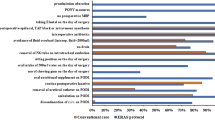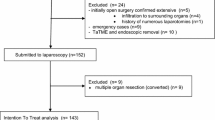Abstract
Background
Enhanced recovery after surgery (ERAS) is a multimodal perioperative care pathway designed to achieve early recovery by preserving preoperative organ function and minimizing the stress response following surgery. Few studies have assessed the association between ERAS and postoperative cardiac complications. The goal of this study is to evaluate the impact of ERAS on postoperative cardiac complications.
Materials and Methods
A retrospective review of a prospectively maintained database of colorectal patients who underwent surgery at a tertiary colorectal cancer referral center was carried out. Preoperative, intraoperative, and postoperative factors including demographics, comorbidities, medications, and fluid administration were recorded. The primary outcome was postoperative cardiac arrhythmia, and secondary outcomes included other postoperative complications.
Results
A total of 800 patients who underwent elective colorectal surgery were identified. Four hundred seventeen patients (52%) were in the control group and 383 patients (48%) were in the ERAS group. Patients in both groups were similar with regard to demographics and clinical characteristics. There were significantly higher rates of cardiac arrhythmia in the control group (5.3%) compared with the ERAS group (1.8%), p = 0.009. Multivariable analysis revealed that ERAS was an independent predictor of decreased postoperative cardiac arrhythmia (OR 0.30, 95%CI 0.17–0.55, p < 0.001) while older age was an independent predictor of increased postoperative cardiac arrhythmia (OR 1.08, 95%CI 1.02–1.13, p = 0.008). Patients receiving lower amounts of intravenous fluids had significantly decreased postoperative cardiac arrhythmia (OR = 0.25, 95%CI 0.09–0.67, p = 0.006).
Conclusions
ERAS and goal-directed fluid therapy are associated with significant reductions in postoperative cardiac arrhythmias.

Similar content being viewed by others
References
Ren L, Zhu D, Wei Y, et al (2012) Enhanced recovery after surgery (ERAS) program attenuates stress and accelerates recovery in patients after radical resection for colorectal cancer: A prospective randomized controlled trial. World J Surg 36:407–414.
Wilmore DW, Kehlet H. (2001) Recent advances. Management of patients in fast track surgery. Clinical review. Br J Surg 322:473–476.
Wind J, Polle SW, Fung JK, et al (2006) Systemic review of enhanced recovery programmes in colonic surgery. Br J Surg 93:800–809.
Vlug MS, Wind J, Hollmann MW, et al (2001) Laparoscopy in combination with fast track multimodal management is the best strategy in patients undergoing colonic surgery. A randomized clinical trial (LAFA-study). Ann Surg 254(6):868–875.
Greco M, Capretti G, Beretta L, et al (2014) Enhanced recovery program in colorectal surgery: a meta-analysis of randomized controlled trials. World J Surg 38:1531–1541.
Varadhan KK, Neal KR, Dejong CHC, et al (2010) The enhanced recovery after surgery (ERAS) pathway for patients undergoing major elective open colorectal surgery: a meta-analysis of randomized controlled trials. Clin Nutr 29:434–440.
Adamina M, Kehlet H, Tomlinson GA. (2014) Enhanced recovery pathways optimize health outcomes and resource utilization: a meta-analysis of randomized controlled trials in colorectal surgery. Surgery 149:830–840.
Delaney CP, Zutshi M, Senagore AJ, et al (2003) Prospective, randomized, controlled trial between a pathway of controlled rehabilitation with early ambulation and diet and traditional postoperative care after laparotomy and intestinal resection. Dis Colon rectum 46:851–859.
Miralpeix E, Nick AM, Meyer LA, et al (2016) A call for new standard of care in perioperative gynecologic oncology practice: Impact of enhanced recovery after surgery (ERAS) programs. Gynecol Oncol 141:371–378.
Rollo DD, Mohammed A, Rawlinson A et al (2015) Enhanced recovery protocols in urological surgery: a systematic review. Can J Urol 22:7817–7823.
Temple-Oberle C, Shea-Budgell MA, Tan M, et al (2017) Consensus review of optimal perioperative care in breast reconstruction: Enhanced recovery after surgery (ERAS) society recommendations. Plast Reconstr Surg 139:1056–1071.
Regenbogen SE, Shah NJ, Collins SD, et al (2017) Population-based assessment of intraoperative fluid administration practices across three surgical specialties. Ann Surg 265:930–940.
Lilot M, Ehrenfeld JM, Lee C, et al (2015) Variability in practice and factors predictive of total cystalloid administration during abdominal surgery: retrospective two-centre analysis. Br J Anaesth 114:767–776.
Chong PC, Greco EF, Stothart D, et al (2009) Substantial variation of both opinions and practice regarding perioperative fluid resuscitation. Can J Surg 52:207–2014.
Arulkumaran N, Corredor C, Hamilton MA, et al (2014) Cardiac complications associated with goal-directed therapy in high-risk surgical patients: a meta-analysis. Br J Anaesth 112:648–659.
Nelson G, Kiyang LN, Crumley ET, et al (2016) Implementation of enhanced recovery after surgery (ERAS) across a provincial healthcare system: The ERAS Alberta colorectal surgery experience. World J Surg 40:1092–1103.
Uriburu JC, Cillo M, Estefania D, et al (2016) Enhanced recovery after surgery (ERAS) implementation of a protocol in laparoscopic colectomy, initial experience in a single institution in Argentina. Gastroenterol Hepatol 4:101–111.
Khwaja A. (2012) KDIGO clinical practice guidelines for acute kidney injury. Nephron Clin Pract 120:c179-c184.
Miller TE, Roche AM, Mythen M. (2015) Fluid management and goal-directed therapy as an adjunct to enhanced recovery after surgery (ERAS). Can J Anaesth 62:158–168.
Gustafsson UO, Scott MJ, Nygren HJ, et al (2018) Guidelines for perioperative care in elective colorectal surgery: enhanced recovery after surgery (ERAS) society recommendations: 2018. World J Surg 1–37.
Klima DA, Brintzenhoff RA, Agee N, et al (2012) A review of factors that affect mortality following colectomy. J Surg Res 174:192–199.
Roulin D, Blanc C, Muradbegovic M, et al (2014) Enhanced recovery pathway for urgent colectomy. World J Surg 38:2153–2159.
Flynn DN, Speck RM, Mahmoud NN, et al (2014) The impact of complications following open colectomy on hospital finances: a retrospective cohort study. Perioperative Medicine 3:1.
Zheng H, Guo H, Ye J, et al (2013) Goal-directed fluid therapy in gastrointestinal surgery in older coronary heart disease patients: randomized trial. World J Surg 37:2820–2829.
Teeuwen PH, Bleichrodt RP, Strik C, et al (2010) Enhanced recovery after surgery (ERAS) versus conventional postoperative care in colorectal surgery. J Gastroinest Surg 14:88–95.
Eskicioglu C, Forbes SS, Aarts M, et al (2009) Enhanced recovery after surgery (ERAS) programs for patients having colorectal surgery: A meta-analysis of randomized trials. J Gastrointest Surg 13:2321–2329.
Khoo CK, Vickery CJ, Forsyth N, et al (2007) A prospective randomised controlled trial of multimodal perioperative management protocol in patients undergoing elective colorectal resection for cancer. Ann Surg 245:867–872.
Author information
Authors and Affiliations
Contributions
All authors had substantial contributions to the design of the work, drafted the work, made the final approval, and agreed to be accountable for all aspects of the work.
Corresponding author
Ethics declarations
The study was reviewed and approved by the Institutional Review Board
Conflict of Interest
The authors declare that they have no conflict of interest.
Additional information
Publisher’s Note
Springer Nature remains neutral with regard to jurisdictional claims in published maps and institutional affiliations.
Rights and permissions
About this article
Cite this article
Fields, A.C., Dionigi, B., Scully, R.E. et al. Reduction in Cardiac Arrhythmias Within an Enhanced Recovery After Surgery Program in Colorectal Surgery. J Gastrointest Surg 24, 1158–1164 (2020). https://doi.org/10.1007/s11605-019-04298-7
Received:
Accepted:
Published:
Issue Date:
DOI: https://doi.org/10.1007/s11605-019-04298-7




